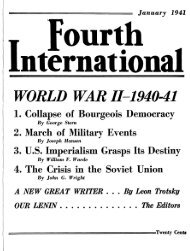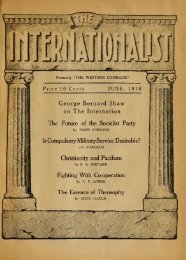The Stalin school of falsification - Marxists Internet Archive
The Stalin school of falsification - Marxists Internet Archive
The Stalin school of falsification - Marxists Internet Archive
You also want an ePaper? Increase the reach of your titles
YUMPU automatically turns print PDFs into web optimized ePapers that Google loves.
<strong>Stalin</strong> School <strong>of</strong> Falsification -- Chapter 11<br />
dear the interest <strong>of</strong> the movement, will keep on working, the rest will take care <strong>of</strong> itself. This, in my<br />
opinion, is for the best."<br />
This is not the place to dwell on how correctly <strong>Stalin</strong> had defined the composition <strong>of</strong> the blocs. That is<br />
not in question here. Lenin was waging a desperate struggle against the legalists, liquidators and<br />
opportunists, for the perspective <strong>of</strong> the second revolution. All the groupings abroad at that time were<br />
fundamentally determined by that struggle. But how did the Bolshevik, <strong>Stalin</strong>, evaluate these battles?<br />
Like the most inept empiricist: "A tempest in a teapot; let them climb the walls; keep on working, the rest<br />
will take care <strong>of</strong> itself." <strong>Stalin</strong> welcomes the mood <strong>of</strong> indifference to theory and the presumed superiority<br />
<strong>of</strong> myopic "practicals" over revolutionary theorists. "This, in my opinion is for the best," he writes with<br />
reference to those moods which were characteristic <strong>of</strong> the period <strong>of</strong> reaction and decline. Thus, in the per<br />
son <strong>of</strong> <strong>Stalin</strong>, the Bolshevik, we have not even political conciliationism -- for, conciliationism was an<br />
ideological tendency, which attempted to create a principled platform -- we have blind empiricism,<br />
verging on complete disregard <strong>of</strong> the principled problems <strong>of</strong> the revolution.<br />
It is not difficult to imagine the lashing the hapless editors <strong>of</strong> Zarya Vostoka received for the publication<br />
<strong>of</strong> this letter; and the measures that were taken on an "All-Union scale" to prevent any further publication<br />
<strong>of</strong> such letters.<br />
6. In his report at the Seventh Plenum <strong>of</strong> the E.C.C.I. (1926), <strong>Stalin</strong> characterized the party's past in the<br />
following manner:<br />
If we take the history <strong>of</strong> our party from the moment <strong>of</strong> its inception in the shape <strong>of</strong> the Bolshevik group<br />
in 1903, and if we follow its subsequent stages down to our own day, then we can say without<br />
exaggeration that the history <strong>of</strong> our party is the history <strong>of</strong> the conflict <strong>of</strong> the contradictions within the<br />
party. <strong>The</strong>re is not, and there cannot be a 'middle' line in questions <strong>of</strong> a principled character. . .<br />
<strong>The</strong>se momentous words were directed against ideological "conciliationism" toward those against whom<br />
<strong>Stalin</strong> was waging his struggle. But these abstract formula <strong>of</strong> ideological irreconcilability are in complete<br />
contradiction with the political physiognomy and the political past <strong>of</strong> <strong>Stalin</strong> him self. As an empiricist he<br />
was a congenital conciliationist, but precisely because he was an empiricist he gave no principled<br />
expression to his conciliationism.<br />
7. In 1912, <strong>Stalin</strong> participated in Zvezda, the legal news paper <strong>of</strong> the Bolsheviks. <strong>The</strong> Petersburg editorial<br />
board, in a direct struggle against Lenin, issued this paper at first as a conciliationist organ. Here is what<br />
<strong>Stalin</strong> wrote in a programmatic editorial article:<br />
"...It will be a source <strong>of</strong> satisfaction to us, if our news paper succeeds, without falling into the polemical<br />
infatuation <strong>of</strong> the differeut factions, in defending ably the spiritual treasures <strong>of</strong> consistent democracy<br />
which are being impudently encroached upon both by the open enemies and the false friends." (<strong>The</strong><br />
Revolotion and the C.P.S.U.-Materiais and Documents, Vol. V, pp. 161f.)<br />
<strong>The</strong> phrase referring to the "polemical infatuation <strong>of</strong> the different [ ! ] factions" is aimed entirely against<br />
Lenin, against Lenin's "tempest in a teapot," and his constant readiness to "climb the walls" due to some<br />
sort <strong>of</strong> "polemical infatuation."<br />
Thus, <strong>Stalin</strong>'s article is completely in harmony with the vulgar conciliationist tendency expressed in his<br />
above-quoted letter <strong>of</strong> 1911, and is in complete contradiction with his latter-day declaration as to the<br />
impermissibility <strong>of</strong> a middle line in questions <strong>of</strong> a principled character.<br />
http://www.marxists.org/archive/trotsky/works/1937-st2/sf11.htm (3 <strong>of</strong> 12) [06/06/2002 15:07:13]

















